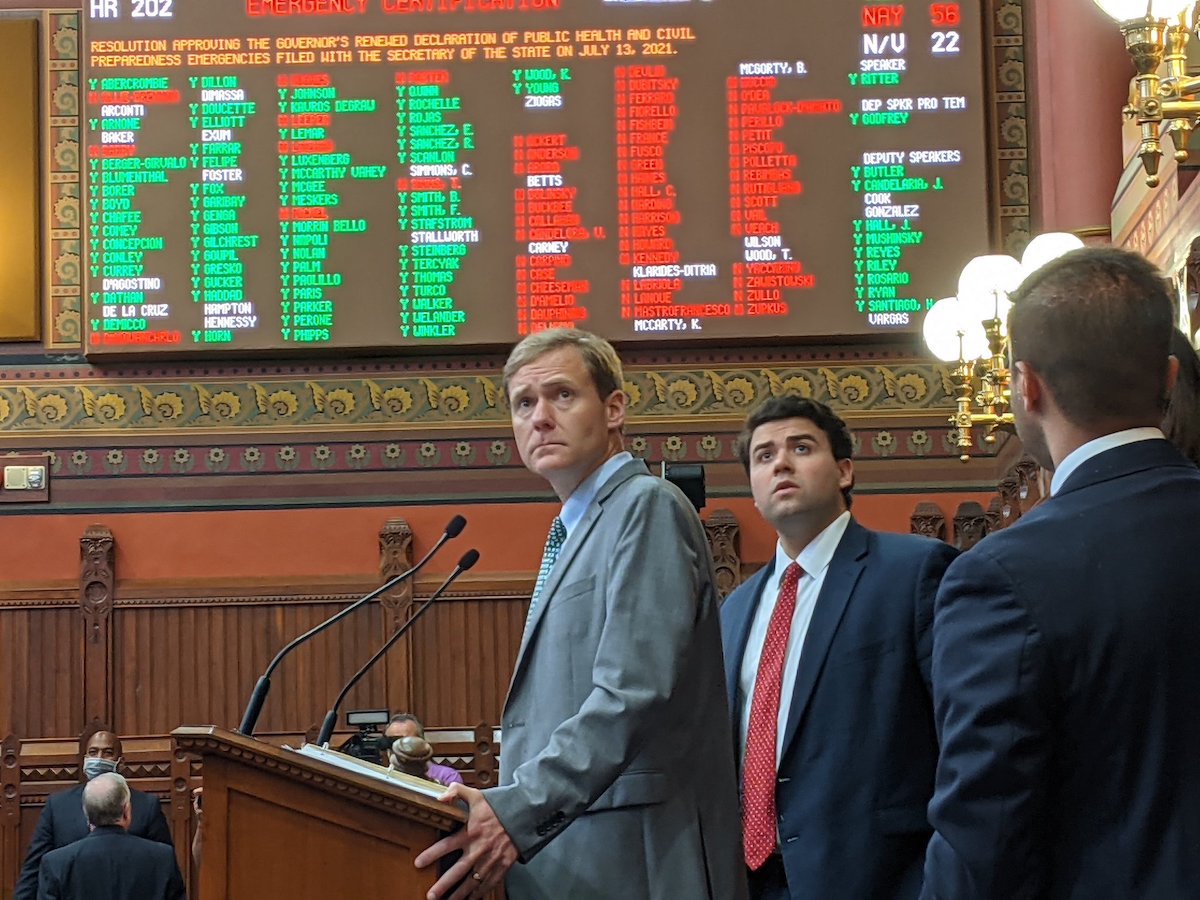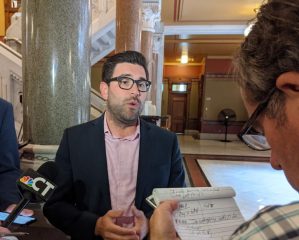Legislature Extends Governor’s Emergency Powers For Fifth Time

Audio By Carbonatix

House Speaker Matt Ritter watches the vote (Hugh McQuaid / CTNewsJunkie)
HARTFORD, CT — The House and Senate voted Wednesday to extend for another two months, emergency declarations giving Gov. Ned Lamont the authority to continue almost a dozen executive orders on COVID-19 policy.
Lamont, a Democrat, has been operating with increased authority since March of 2020. Last week he requested the legislature meet to continue that authority in order to keep 11 executive orders in place beyond their scheduled deadline on July 20.
As he left his office after the vote, the governor said he was pleased with the extension.
Both chambers approved the extensions until Sept. 30. Although the resolutions were passed by Democrats, a significant number joined all Republicans to vote against them. The House passed the resolution 73 to 56 with nine Democrats in opposition. The Senate voted 19 to 15 with “No” votes from four Democrats including Sens. Saud Anwar of South Windsor, Dennis Bradley and Marilyn Moore of Bridgeport, and Cathy Osten of Sprague.
“We need to be prudent and recognize that this pandemic is still ongoing,” Senate President Martin Looney said as the extension resolutions were being debated. He pointed to the state’s COVID infection rate, which rose Wednesday to above 1%, its highest since May.
However, Republicans opposed the extension, saying they were unnecessary because the pandemic emergency had subsided to a more manageable level. Conservative organizers had spent the last week building opposition to Lamont’s emergency powers and held a rally Monday on the steps of the state Capitol building, demanding the legislature reject them.
During a Wednesday press conference outside the Senate chamber, Minority Leader Kevin Kelly gestured to a map of the northeast region. Although roughly half the states in the country still have emergency orders in place, Connecticut and Rhode Island are alone in the northeast corner.
In his letter to lawmakers last week, the governor said he needed the ongoing emergency power to allow the state to continue qualifying for federal emergency funds, manage vaccination clinics, set rules for school COVID policies, and give tenants more time to qualify for assistance if they are behind on their rent.

Chief Spokesman Max Reiss (Hugh McQuaid / CTNewsJunkie)
On Wednesday, his chief spokesman, Max Reiss, told reporters that Lamont has steered Connecticut in a different direction than its regional neighbors when it seemed the appropriate move.
However, some questioned whether the emergency declarations were required to continue qualifying for federal emergency funds and pointed to other states which have found workarounds to maintain the funding without an active declaration.
Meanwhile, opponents argued the governor’s ongoing emergency power comes at the expense of the legislature’s powers, which are meant to serve as a check on the executive.
“The governor comes to us all the time and says ‘I need things. Make suggestions. You should deal with it. You should vote on it.’ What’s before us here today, takes that power away from us, no matter what our constituents think,” Rep. Craig Fishbein, R-Wallingford, said during the House debate.
With the orders renewed beyond the start of the next school year, many parents are watching to see whether the state will require students to wear masks when they return to classrooms in the fall. Last week the Centers for Disease Control recommended that students and teachers who have been vaccinated against the COVID-19 virus not be required to wear masks. But regulators have not yet approved a vaccine for children younger than 12 years old.
Reiss said the Public Health and Education Departments were working on a policy for the coming school year and awaiting additional guidance from the CDC.
“Those conversations are currently happening and our goal is to have an update on that hopefully sooner than later because we know that all of these schools are going to be making their preparations for the fall,” Reiss said.
Republished with permission from CTNewsJunkie.com, all rights reserved.
Like what you see here? Click here to subscribe to We-Ha’s newsletter so you’ll always be in the know about what’s happening in West Hartford! Click the blue button below to become a supporter of We-Ha.com and our efforts to continue producing quality journalism.



